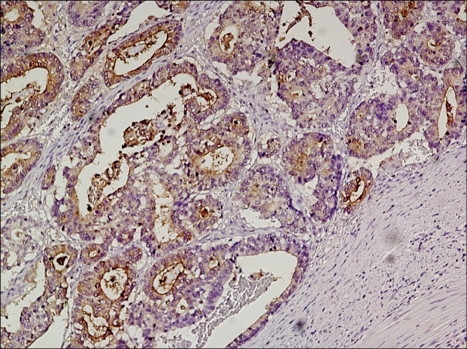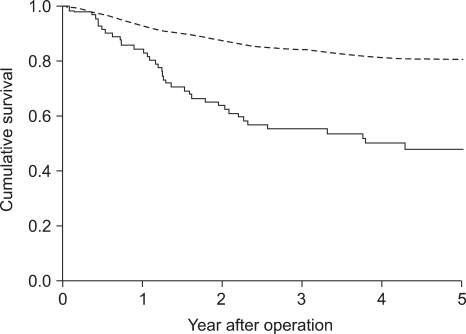Cancer Res Treat.
2008 Mar;40(1):16-21.
Prognostic Significance of Serum and Tissue Carcinoembryonic Antigen in Patients with Gastric Adenocarcinomas
- Affiliations
-
- 1Department of Surgery, Kyungpook National University Hospital, Daegu, Korea. wyu@mail.knu.ac.kr
- 2Department of Surgery, Daedong Hospital, Busan, Korea.
Abstract
-
PURPOSE: Carcinoembryonic antigen (CEA) is known to be elevated in nearly all solid malignancies. The prognostic role of CEA in gastric cancers however, is still controversial. We evaluated preoperative serum CEA levels and CEA expression from the resected tumor tissues to determine whether they have prognostic significance in gastric cancer patients.
MATERIALS AND METHODS
Medical records of 810 patients who underwent surgery for gastric adenocarcinoma from June, 1998 to February, 2002 in Kyungpook National University Hospital were reviewed. Serum CEA level was evaluated by radioimmunoassay preoperatively, and the cut-off level for positivity was 7.0 ng/ml. Labeled streptavidin-biotin peroxidase method was used to determine CEA expression from the gastric cancer tissues.
RESULTS
Serum and tissue CEA were positive in 9.3% and 91.1% of the patients, respectively. They had no correlation with each other. The positivity rate of serum CEA had positive correlation with invasion depth (p<0.001), lymph node metastasis (p<0.001), distant metastasis (p=0.006), and final stage (p<0.001). Well differentiated tumors showed higher serum CEA positivity (p=0.002). Patients with positive serum CEA had higher recurrence rate (p<0.001). Multivariate analysis showed significantly lower survival rate in patients with preoperative CEA levels over 7 ng/ml than those with lower levels (48.0% vs. 80.7%; p<0.001). The positivity rates of tissue CEA were higher in advanced cancers (p=0.033) and in more advanced stages (p=0.029). Tissue CEA positivity showed no correlation with recurrence or survival.
CONCLUSIONS
Preoperative serum CEA level had correlation with disease progression and survival in gastric cancer patients, and proved to be an independent prognostic factor. Tissue CEA expression in gastric cancers had no prognostic information.
Keyword
MeSH Terms
Figure
Reference
-
1. Abelev GI, Perova SD, Khramokora NI, Prostnikova ZA, Irin IS. Production of embryonal alpha-globulin by transplantable mouse hepatomas. Transplantation. 1963; 1:174–180. PMID: 14010646.2. Thomson DM, Krupey J, Freedman SO, Gold P. The radioimmunoassay of circulating carcinoembryonic antigen of the human digestive system. Proc Natl Acad Sci USA. 1969; 64:161–167. PMID: 5262998.
Article3. Yamao T, Kai S, Kazami A, Koizumi K, Handa T, Takemoto N, et al. Tumor markers CEA, CA19-9 and CA125 in monitoring of response to systemic chemotherapy in patients with advanced gastric cancer. Jpn J Clin Oncol. 1999; 29:550–555. PMID: 10678558.
Article4. Kelsen DP. Fischer DS, editor. Gastric cancer. Follow-up of cancer, a handbook for physicians. 1996. 4th ed. Philadelphia: Lippincott-Raven Publishers;p. 36–37.5. Hammarstrom S, Shively JE, Paxton RJ, Beatty BG, Larsson A, Ghosh R, et al. Antigenic sites in carcinoembryonic antigen. Cancer Res. 1989; 49:4852–4858. PMID: 2474375.6. Schwartz MK. Current status of tumour markers. Scand J Clin Lab Invest Suppl. 1995; 221:5–14. PMID: 7652491.
Article7. Kodera Y, Yamamura Y, Torii A, Uesaka K, Hirai T, Yasui K, et al. The prognostic value of preoperative serum levels of CEA and CA19-9 in patients with gastric cancer. Am J Gastroenterol. 1996; 91:49–53. PMID: 8561143.8. Nakane Y, Okamura S, Akehira K, Boku T, Okusa T, Tanaka K, et al. Correlation of preoperative carcinoembryonic antigen levels and prognosis of gastric cancer patients. Cancer. 1994; 73:2703–2708. PMID: 8194009.
Article9. Nishida H. Immunohistochemical localization of carcinoembryonic antigen (CEA) in gastric cancer--a comparative study between tissue CEA and plasma CEA. Nippon Geka Gakkai Zasshi. 1983; 84:328–335. PMID: 6371486.10. Tachibana M, Takemoto Y, Nakashima Y, Kinugasa S, Kotoh T, Dhar DK, et al. Serum carcinoembryonic antigen as a prognostic factor in resectable gastric cancer. J Am Coll Surg. 1998; 187:64–68. PMID: 9660027.
Article11. Hirai H. A collaborative clinical study of carcinoembryonic antigen in Japan. Cancer Res. 1977; 37:2267–2274. PMID: 67888.12. Carcinoembryonic antigen: its role as a marker in the management of cancer. A national institutes of health consensus development conference. Ann Intern Med. 1981; 94:407–409. PMID: 7224393.13. Martin EW Jr, Kibbey WE, Di Vecchia L, Anderson G, Catalano P, Minton JP. Carcinoembryonic antigen: clinical and histological aspects. Cancer. 1976; 37:62–81. PMID: 1247968.14. Hansen HJ, Snyder JJ, Miller E, Vandevoorde JP, Miller ON, Hines LR, et al. Carcinoembryonic antigen (CEA) assay. A laboratory adjunct in the diagnosis and management of cancer. Hum Pathol. 1974; 5:139–147. PMID: 4811605.15. Alexander JC, Silverman NA, Chretien PB. Effect of age and cigarette smoking on carcinoembryonic antigen levels. JAMA. 1976; 235:1975–1979. PMID: 56468.
Article16. Kojima O, Ikeda E, Uehara Y, Majima T, Fujita Y, Majima S. Correlation between carcinoembryonic antigen in gastric cancer tissue and survival of patients with gastric cancer. Gann. 1984; 75:230–236. PMID: 6373475.17. Wittekind C, Wachner R, Henke W, von Kleist S. Localization of CEA, HCG, lysozyme, alpha-1-antitrypsin, and alpha-1-antichymotrypsin in gastric cancer and prognosis. Virchows Arch A Pathol Anat Histopathol. 1986; 409:715–724. PMID: 3092465.
Article18. International Union against Cancer. Sobin LH, Wittekind Ch. TNM classification of malignant tumors. 1997. 5th ed. Heiderberg: Springer.19. Japanese Gastric Cancer Association. Japanese Classification of Gastric Carcinoma - 2nd English Edition. Gastric Cancer. 1998; 1:10–24. PMID: 11957040.20. Tabuchi Y, Deguchi H, Saitoh Y. Carcinoembryonic antigen levels of portal blood in gastric cancer patients. J Surg Res. 1989; 47:81–86. PMID: 2739403.
Article21. Kiyama T, Onda M, Tokunaga A, Nishi K, Mizutani T, Yoshiyuki T, et al. Changes in serum and tissue carcinoembryonic antigen with growth of a human gastric cancer xenograft in nude mice. Jpn J Cancer Res. 1990; 81:58–62. PMID: 2108947.
Article22. Mori M, Ambe K, Adachi Y, Yakeishi Y, Nakamura K, Hachitanda Y, et al. Prognostic value of immunohistochemically identified CEA, SC, AFP, and S-100 protein-positive cells in gastric carcinoma. Cancer. 1988; 62:534–540. PMID: 2455589.
Article23. Nakane Y, Okamura S, Akehira K, Boku T, Okusa T, Tanaka K, et al. Correlation of preoperative carcinoembryonic antigen levels and prognosis of gastric cancer patients. Cancer. 1994; 73:2703–2708. PMID: 8194009.
Article
- Full Text Links
- Actions
-
Cited
- CITED
-
- Close
- Share
- Similar articles
-
- Significance of Sulphomucin and CEA Expression in Advanced Gastric Adenocarcinomas
- Assessment of prognostic role od serum carcinoembryonic antigen monitoring in patients with stomach, colorectal and breast cancers
- Clinical Significance of Serum Carcinoembryonic Antigen Level in Rectal Cancer Patients Who Underwent Preoperative Chemoradiotherapy
- Individualized Cutoff Value of the Serum Carcinoembryonic Antigen Level According to TNM Stage in Colorectal Cancer
- The Comparative Immunohistochemical Study of Carcinoembryonic Antigen(CEA) by Immunoperoxidase Method Between Polyps and Adenocarcinoma of the Stomach



